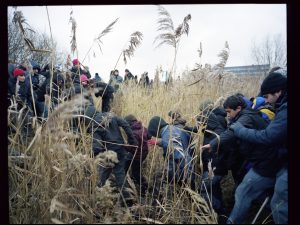What is NATO?
NATO was formed in the wake of World War II as a defensive alliance against the then-superpower Soviet Union. It was a “child of the Cold War,” according Richard Longworth, a senior fellow at the Chicago Council on Global Affairs, who spoke to students at Columbia College Chicago.

A widely referenced portion of the treaty, Article 5, asserts that an attack on one member of NATO constitutes an attack on all, Longworth said. During the Cold War, the threat of war was so great that Article 5 was never invoked, he explained.
The purpose and ongoing mission of the North Atlantic Treaty Organization also was the focus of a debate at the the Pritzker Military Library Thursday night.
J.D. Bindenagel, a former U.S. Ambassador, said beyond combat and military force NATO also has responsibilities and power in regards to developing stability and reconstruction, often after the military action. He said NATO allowed Europe to rebuild and stabilize after being ravaged by World War II. Establishing stable infrastructure and economic means would in turn lessen the need for military actions, Bindenagel said.
“The presence of NATO has made it possible for stability [and] security to be enhanced for sixty years in Western and all of Europe,” he said. “If you can create the climate for security you can create the climate for economic growth and stability. Then there is less use for the military.”
As the dust settled from the collapses of the Berlin Wall and Soviet Union, many began to wonder what the future of the organization held, or if there was any meaning to NATO without the threat of war with the Soviets, Longworth explained. Some called for the dissolution of the alliance, and some are still calling for it today.
Critics of NATO said it has transformed from a defensive measure into a war machine or global police force that can be utilized on a whim through abuse of Article 5.
“The fact that NATO has pulled together an international network of 50 nations willing to send their sons and daughters to kill and die in a useless war is an indication of how dangerous of a phenomenon NATO has become in the post Cold War era,” said Rick Rozoff, a Stop NATO organizer.
John Allen Williams, a professor of political science at Loyola University said NATO’s existence isn’t the primary problem, but more judicious application of military force is.
“Arguably using military force to stop a genocide is a good idea,” Williams said. “The problem is the use of force, it’s how you’re using [and] to what purpose.”
Williams said that a number of efforts NATO carries out, including combatting piracy, providing humanitarian relief and peacekeeping all require the use of force. He said he thinks NATO provides a more effective and more easily mobilized force to pursue those missions.
“Can military capability sometimes be misused?” Williams said, “Absolutely. Can it be used for reasons that were not worth it? Yes, [it] surely can be. But you have to recall that sometimes force is necessary and NATO is an efficient way to do it.”
Iris Feliciano, of Iraq Veterans Against the War, said drawing from her experience in the U.S. Marine Corps led her to believe using military force to build peace and stability was a flawed idea, because the troops deployed are not trained to do so.
“Troops on the ground are not trained for peacemaking,” she said. “They’re trained to kill, to search and destroy the enemy. They’re not trained to turn that mechanism off from one month to the next because policymakers in Chicago are meeting to change that. Just because NATO decides [to change policy] the troops don’t get to turn [their disposition] off.”












Be First to Comment